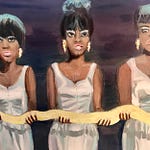The day Tom Cruise sock-slid into his parents’ living room in his Ray Bans and white underpants, America didn’t realize it, but its male archetype had just been castrated. Hollywood had begun a long-game brainwash that would result in American men choosing lifestyles that would render them eternally adolescent...and for all intents and purposes, essentially gay.
During the golden era of the silver screen, post-depression-era leading men like Henry Fonda, Jimmy Stewart, Gary Cooper and Gregory Peck were cast as leaders, decent, right and true, who blazed trails westward and sacrificed their own comforts to build greater prosperity for future generations. These screen idols (and their movie scripts) performed a potent male ability to correct societal wrongs by courageously speaking truth to power to protect the weak and champion the downtrodden. They worked to make the machine softer.
They were mild-mannered, righteous men who would become so outraged by institutional injustice they would get up on their hind legs and pound podiums. Their characters were built on ideals of hard-won virtues like loyalty, honesty, fealty, and the lonely autonomy that was once the signature trait of the American Male archetype/Hero.
Even the criminal archetypes in the Post WWII-era were formidable, three-dimensional, adults: Robert Mitchum was a deliberate, calculating sociopath in Night of the Hunter (1955), terrifying in that unpredictable way that can only be represented by a smart but unhinged man bound by no authority but his own bizarre cosmology and his ability to execute justice with two fists named LOVE and HATE.
In the fifties, when high school girls began screaming and fainting from psycho-sexual overload for Elvis, and young men began to ride motorcycles together in leather jackets in imitation of Marlon Brando in The Wild One (1953), the Establishment began muttering openly about a widening “Generation Gap” (and youth culture began referring to the Powers That Be as “The Establishment.”)
The 1960s saw the reification of this repressed tension: There was an acknowledged, all-out culture war between the young and the old: the Hip Vietnam Protestors vs. the War Pig Establishment. (Only the Rat Pack really knew how to get their suits tailored or which side of the law and the bar they were swinging from during that upheaval; they remained strictly Mafia. )
Up to the 1970’s, the American Leading Man either fought the system and won, or invented alternative societies within the larger system wherein they kept their own discrete laws, moral codes and cultural identities: e.g. Al Pacino in “The Godfather;” Ron O’Neal in “Superfly.”
When MTV launched in 1981, youth subcultures went briefly androgynous. There was a temporary oasis of relative sexual equality that culminated in Grace Jones becoming enough of a sex-symbol to be cast as a Bond girl (and Bond being in touch enough with his submissive feminine side to bed her.) But, once owned by Viacom, music-driven subcultures stopped being a comment on the mainstream - they became the mainstream.
In 1986, the jingoistic intentions of this cultural poison-pill began to reveal themselves. Tom Cruise in Top Gun (a 90-minute infomercial for Reaganomics-a-Go-Go) marked the beginning of the love affair that would one day destroy the marriage between America’s Archetypal Man and Archetypal Women: men onscreen were being aggressively seduced by a new paradigm of gadget-centric technological warfare.
The American Male Archetype was about to become a tech dweeb, a psychic castrato, and an eternal adolescent.
All military dictatorships cultivate intellectual homosexuality (mono-sexuality) and posit man-on-man Bro-love as the preferred love --but it is particularly essential to a country with a volunteer military. It is now openly if not explicitly implied by our popular media that Real Love is the stuff that the Brotherhood of Marines has for each other, and that sticky, clingy, bothersome wives and girlfriends have no intrinsic value - they are merely obstacles to men’s true happiness.
“Bromance” isn’t a new concept. Hollywood has always enjoyed a love story between men: Butch and Sundance, Tango and Cash, Harley Davidson and the Marlboro Man, Ponch and John, Spock and Kirk. But recently this trope has taken on a subtle but explosive new dimensions.
In Hollywood, it arguably started with an excellent love scene between straight boy superstars Keanu Reeves and the late River Phoenix in Gus van Sant’s My Own Private Idaho (1991), but man-on-man love really dropkicked into the mainstream when two cowboys played by Jake Gyllenhall and the late Heath Ledger loved their way into winning the Best Picture Oscar for “Brokeback Mountain” in 2005 (four years into our post 9/11 Revenge on East Asia.)
The Bromantic comedy I Love You, Man (2009) brilliantly managed to take homosexuality public, yet make it somehow Not Gay. The wives are petty, brittle, needling, insecure harpies, incapable of providing the supersensitive cozy understanding that only a man can give another man.
American Leading Men went from being capable of worshiping a fickle, capricious bitch-goddess like Greta Garbo and sexing Grace Jones to being an army of Jonah Hills: intellectually homosexual, overweight, intimacy-phobic, wasted teenage slave-boys that watch more porn than news, and live to kill robots with robots on their couch with each other. If you watch The Thin Man these days, the sophisticated, multi-entendre, intersexual banter may as well be in French.
The blatant homoeroticism in the Channing Tatum hit Magic Mike was revelatory, (particularly since the screenplay was allegedly based on Mr. Tatum’s pre-stardom job experiences). In the film, the stripper-boys perform for audiences of screaming sorority girls -- but the boys are really performing for each other. Their all-male stripper kick-line in camo hot-pants sounds off “One-two!” and crunk-humps the stage in unison; the boys confess X-addled buddy-buddy “I love you man, no really, I love you” sentiments before having threesomes, foursomes, with their (nameless, disposable, afterthought-y) dates, wives and girlfriends. Gay? Naaaaahhhhhh. Awesome!
Ruling class authorities (read: the super-rich forces manipulating our foreign policy into their very own Game of Thrones) have always known that if you want to dehumanize an enemy in order to justify invading/exploiting their lands and murdering their people in the classic Imperial Killer Baboon way, a society needs to learn how to recognize and dehumanize an Other at home. If political leaders aren’t up to weathering the negative press that invariably accompanies an overtly racist movement like the KuKluxKlan or the neo-Nazis, one need look no further for convenient whipping-Others than our very own devouring, castrating, wife/girlfriend/(m)Others. Women, as the biological custodians of the birth process, are the natural enemy of War, and the financially enriching, patriotic, rape, exploitation and situational homosexuality that goes along with it.
If you don’t think American society is being coaxed, year by year, into accepting the behavior of a predominately gay, Spartan, military dictatorship/warrior society as “normal,” I have three letters for you: MMA (‘nuff said.)
Oddly enough, the mythology of male heterosexual love on film, here in the dawn of America’s apparently eternal wartime, has become unsexual, weirdly martyrish and sublime. In Drive (2011), Ryan Gosling, our generation’s Helen of Troy, sacrifices himself for a woman with whom he got to share exactly one moment of healthy feeling. It is an abstract love, verboten and effectively dead on arrival. Its function, mainly, is that of a disposable, crashed vehicle through which the Driver entitles himself to a perverse sense of ennobling self-pity.
The Driver’s true love is himself, his toothpick, and the world weeping in his rearview mirror. The warrior, wholly overinvolved with his own beautifully sculpted, finely tuned, perfectly oiled killing-machine of a self, cannot be known as a person. He can’t remain in one place; he has to move like a shark or face the certain ego-doom of self-examination. His only choice is to keep pumping himself and other people full of iron, to risk his life and die in glorious vain, because this is the ultimate mind-fucked narcissistic triumph of the cowardly adolescent male: escape from adulthood, even at the price of death.
The new Hollywood male archetype is autochthonous: he programs his own prefab legend, and any way the algorithm crumbles, it is a saga of self-defeat and self-extinction. He births himself without a mother or father, he sexes himself like a crayfish; he lays his own image-eggs on a vertical mirror; he fails to hatch himself. He is an insect, a germ, a virus. He is untouchable by love or female hands. Children will never know him as anything more than a temporary vapor in a coke-white leather jacket, but the single mothers left behind will cry about how honorable he was. He had barely arrived when he was suddenly gone. He is now just a memory, a legend; his contoured cheekbones are beautifully framed by oncoming headlights; he is swaddled in the tragic glamour of the narcissistic, closeted, ridiculous, and wholly fucking delusional.
The Yearling (1946) is perhaps one the most moving portraits of what we have lost in the American landscape, both in nature and as human communities and families. Nature is alive, in its beautiful, tangled, unmolested state of interdependent sync. The boy runs with herds of deer, and jumps over huge fallen trees that died naturally and were allowed to lay there. The boy endures terrible experiences: snake-bites, grave illnesses. He often hates his father or his mother, but the parental team isn’t as interested in being liked all the time as they are in realistically guiding their son through the various traumas that attend maturing into a functional grownup. He must face and come to terms with death when ordered to put down a suffering animal with a gun, and it is appropriately devastating.
But life is easier now -- it’s cheaper and more disposable. Reality, nature, maturity and Mom have all been spayed, girdled, plucked, deodorized and de-bugged and rendered obsolete. If you never grow up, you never need to face the ordeal of replacing your father, you never need to fuck the same woman twice, and you never need to graduate from being a lying wooden puppet into a real boy. Stay gold, Ponyboy. Stay forever young, Napoleon Dynamite.
Hand over your balls to the TSA agent, gentlemen.
(Wait...there are no more gentlemen. Mission Accomplished.)
Looking for a book/screenplay coach who will make your mess somehow work? Holler at me: cintraw@gmail.com
Artwork: “Jack Lord,” oil on canvas by Cintra Wilson, 2020















Share this post